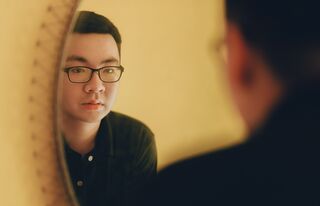Psychiatry
When Our Thoughts Are Not Our Own
Sometimes people deny ownership of the thoughts they have. Are they wrong?
Posted May 19, 2022 Reviewed by Kaja Perina
When I have a thought, I may be unsure whether the thought is true or not, but there seems to be at least one thing I can be sure of: it is my thought, and not someone else's. Our ownership of our thoughts was taken to be indubitable by the philosopher Ludwig Wittgenstein, who held that uncertainty about this was "nonsensical." What sense could there be, Wittgenstein wondered, in even asking whether a thought that I have is thought by me?
The philosopher Sydney Shoemaker codified this question into a principle: immunity to error through misidentification. Statements about our thoughts and perceptions, holds Shoemaker, are ones where we might misidentify the object (that is, what the thought is about) but where we cannot misidentify the subject (that is, who is doing the thinking).

For both Wittgenstein and Shoemaker, this kind of phenomenon is not merely an interesting fact about our mental life. It is indicative, somehow, of the very nature of the self, of the elusive "I." What is the self? It is, first of all, that being who is certainly the thinker of these thoughts.
Yet this alleged fact is not nearly as secure as it seems to be. It is called into question from two directions, one psychiatric and one spiritual. As interesting as the phenomenon itself is the way in which these two distinct challenges appear to converge.
The first challenge arises from consideration of schizophrenia spectrum disorders, and especially the "first-rank symptoms" initially described by the psychiatrist Kurt Schneider. While it is customary to think of delusions and hallucinations as the hallmarks of schizophrenia, the diagnostic criteria suggested by Schneider are more varied than this. (First-rank symptoms have tended to be de-emphasized in contemporary diagnostic manuals, and their diagnostic role remains contested; see this 2015 Cochrane Review for one discussion).
One symptom is "thought insertion." Thought insertion occurs when one takes a thought one is having to (somehow) not be one's own. For example, I have a thought that it would be nice to have an ice cream, but take this thought to in some sense come from elsewhere – to have been "inserted." This is not an auditory hallucination, or is not necessarily so. Rather, it involves simply taking a thought (which "sounds" just like one's own thoughts) to be someone else's.
The second challenge is superficially quite different. In a number of religious traditions, individuals describe hearing the voice of God. Here too it is tempting to understand these reports on the model of auditory hallucinations, which is what talk of "hearing a voice" suggests. But many subjects of these experiences report that this is not the right model.
Consider the experiences thoughtfully documented in Tanya Luhrmann's When God Talks Back, an extended study of an evangelical Christian community. Luhrmann's subjects insist that God's voice does not sound any different from their own. Instead, they take it that some of their thoughts – ones that superficially seem just like all their other thoughts – are not their own, but are rather God's. The task of hearing the voice of God, in this tradition, is a task of identifying (or 'discerning') the thoughts that are not one's own, but are instead thoughts of God.
For both challenges, the platitude defended by Wittgenstein and Shoemaker appears to break down. These individuals do not find it obvious that the thoughts in their mind are their own thoughts, as opposed to someone else's. Far from finding this obvious, they explicitly deny that this is so: they take it that the thoughts that they are having are, at least in some cases, not their own but someone else's.
How should we understand this breakdown? We might understand it on the model of delusion: these individuals have the false belief that their thoughts are not their own. This would not be to deny the platitude that the thoughts we have are our own thoughts, but simply to admit that someone might coherently disbelieve this purported truism. There is a simplicity to this explanation, as we know on independent grounds that individuals with schizophrenia have delusions: this would be, as it were, just another delusion.
This response has a couple of defects, however. First of all, it seems to get the phenomenology wrong. Those who experience thought insertion, for example, insist that thought insertion is as much a quasi-perceptual phenomenon as it is a cognitive one. Thought insertion involved the "feeling of foreignness" that another early psychiatrist, Schröder, took to be basic and unanalyzable. Earlier we cautioned against assimilating thought insertion to hallucination; so too should we hesitate against assimilating it to delusion.
Second, this response invalidates the beliefs of a broad range of individuals. Consider the individuals discussed in Luhrmann's book: they are thoughtful, well informed, and often occupy positions of significant responsibility in their professions and families. They simply assert that the thoughts that they have are sometime not their own. Who are we, exactly, to insist their beliefs are delusional?
A better response, I think, slightly relaxes our stance towards immunity to error through misidentification. This is not an indubitable truth, as Wittgenstein took it to be: it is coherently doubted by many people, individuals with certain mental health diagnoses and certain religious believers among them.
This is not to say, however, that immunity to error through misidentification is merely a psychological generalization about most 'typical' or 'normal' people. Instead, it constitutes something of a standard or an ideal to which most of us, most of the time, conform. Yet people sometimes fail to meet it and, when they do, we have no grounds for showing that we are right and they are wrong. It is something that we take for granted without being able to prove.
If we understand the immunity to error through misidentification in this way, then we will not straightaway correct those individuals who take the thoughts they are having to belong, ultimately, to someone else. We will instead listen to their reports with charity and a measure of curiosity, acknowledging that a principle so basic to our own mental lives might not be so basic for everyone.
References
Soares-Weiser K, Maayan N, Bergman H, Davenport C, Kirkham AJ, Grabowski S, Adams CE.. (2015) First rank symptoms for schizophrenia. Cochrane Database of Systematic Reviews.




